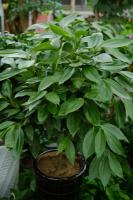What Water Do You Give for Ivy Plants Distilled
Ivy plants are a popular houseplant that can add greenery and beauty to any home. Water is critical for their growth and survival. It is essential to give ivy plants the right type of water to ensure that they thrive. Distilled water is an excellent option for ivy plants because it is pure and contains no mineral or chemical impurities that could harm the plant. However, there are a few things to keep in mind when using distilled water for your ivy plants.
Why Distilled Water is Good for Ivy Plants
Distilled water is an excellent option for ivy plants because it is free of minerals and chemicals that could harm the plant. Unlike tap water, which can contain high amounts of chlorine, fluoride, and other chemicals that can build up in the soil over time, distilled water is pure and safe for the plant to use.
Using distilled water can help prevent mineral buildup in the soil and on the leaves of the plant. When minerals build up in the soil, they can block the plant's roots from absorbing nutrients, which can stunt its growth and cause it to wilt. Additionally, mineral buildup on the leaves can make them look dull and can even burn the plant if left untreated
How to Use Distilled Water for Ivy Plants
When using distilled water for your ivy plants, it is essential to remember a few things:
Make sure the water is at room temperature before using it. Cold water can shock the roots and cause the plant to stress.
Water the ivy plant only when the soil is dry to the touch. Overwatering can cause the roots to rot and eventually kill the plant.
Use a pot with drainage holes to prevent water from accumulating in the bottom of the pot, which can also lead to root rot.
Top up the pot with fresh distilled water every few weeks, as the plant absorbs the water and the level in the pot drops.
Alternatives to Distilled Water for Ivy Plants
If distilled water is not available, there are still other options to use for ivy plants:
Rainwater can be a good option as it is naturally soft and contains no minerals. However, it should be collected away from any potential pollutants and treated before use if there is any concern about contamination.
Filtered water can be a good option if the filter removes minerals and chemicals from tap water, but it is important to replace filters regularly to ensure they are effective.
Tap water can be used if there is no alternative, but it should be left to sit at room temperature for a few hours before use to allow chlorine to dissipate.
Conclusion
Distilled water is an excellent option for ivy plants because it is pure and free of minerals and chemicals that could harm the plant. When using distilled water, it is essential to remember to water the plant only when the soil is dry, use a pot with drainage holes, and top up the pot with fresh water as needed. If distilled water is not available, rainwater or filtered water may be suitable alternatives.
By using the right type of water and taking good care of your ivy plant, you can ensure that it thrives and adds beauty to your home for years to come.

 how many times do yo...
how many times do yo... how many planted tre...
how many planted tre... how many pine trees ...
how many pine trees ... how many pecan trees...
how many pecan trees... how many plants comp...
how many plants comp... how many plants can ...
how many plants can ... how many plants and ...
how many plants and ... how many pepper plan...
how many pepper plan...





























